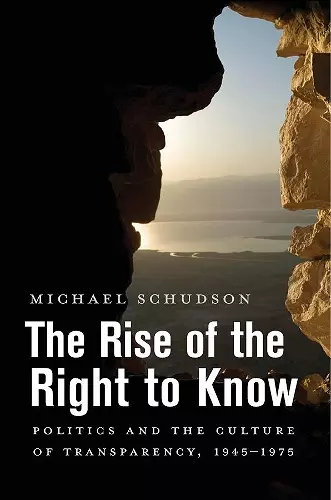The Rise of the Right to Know
Politics and the Culture of Transparency, 1945–1975
Format:Paperback
Publisher:Harvard University Press
Published:26th Oct '18
Should be back in stock very soon

The American founders did not endorse a citizen’s right to know. More openness in government, more frankness in a doctor’s communication with patients, more disclosure in a food manufacturer’s package labeling, and more public notice of actions that might damage the environment emerged in our own time.
As Michael Schudson shows in The Rise of the Right to Know, modern transparency dates to the 1950s, 1960s, and 1970s—well before the Internet—as reform-oriented politicians, journalists, watchdog groups, and social movements won new leverage. At the same time, the rapid growth of higher education after 1945, together with its expansive ethos of inquiry and criticism, fostered both insight and oversight as public values.
“One of the many strengths of The Rise of the Right To Know is its insistent emphasis on culture and its interaction with law…What Schudson shows is that enforceable access to official information creates a momentum towards a better use of what is disclosed and a refinement of how disclosure is best done.”
—George Brock, Times Literary Supplement
“This book is a reminder that the right to know is not an automatic right. It was hard-won, and fought for by many unknown political soldiers.”
—Monica Horten, LSE Review of Books
It’s hard to say anything new about the 1960s, but Michael Schudson has done it—in a big way. An originally conceptualized and eye-opening history, The Rise of the Right to Know identifies the emergence of transparency or openness in the 1960s and ’70s as a leading principle in American political culture. Across a wide range of political and social spheres, he traces the historic shift in our culture from the hidden to the open, the elite to the populist, the expert to the personal, and the rarefied to the accessible—rooted in the liberal, democratic demand that citizens have a right to know about the decisions that shape their lives. This book made me rethink the postwar era and its importance as very few works of scholarship have. -- David Greenberg, Rutgers University
Michael Schudson makes a convincing argument that during [the Cold War era] an unprecedented culture of government openness emerged primarily in domestic institutions. Schudson recounts in detail how the public gained the right of access to government documents; to agencies’ predictions of the environmental consequences of their actions; to basic information about processed foods; and to the deliberations and individual votes of Congress. Thanks to Schudson’s own research and reporting, each of these accounts features an unexpected cast of characters, and each shows how big changes can begin with the actions of a few impassioned individuals. -- Mary Graham * American Prospect *
[A] learned history. -- Jack Shafer * Bookforum *
By piecing together the story of new laws on freedom of information, consumer labeling and environmental impact reports, [Schudson] shows that these laws were part of a longer, slower change, which began well before the Summer of Love. Law entrenched new information rights but nothing would have reached the statute book without a relaxation of the political and cultural climate… One of the many strengths of The Rise of the Right to Know is its insistent emphasis on culture and its interaction with law… What Schudson shows is that enforceable access to official information creates a momentum towards a better use of what is disclosed and a refinement of how disclosure is best done. -- George Brock * Times Literary Supplement *
This book is a reminder that the right to know is not an automatic right. It was hard-won, and fought for by many unknown political soldiers. Even democratic governments do not necessarily consider that openness is a virtue and will resist attempts to prise the lid off their secrets as a matter of course. -- Monica Horten * LSE Review of Books *
This book is illuminating on many levels… This is an optimistic book, suggesting that we are better off with our greater access to information. The book also is a refreshing clarification of history… This book is full of such great anecdotes, woven through an account that melds historical narrative, documentary excavation, ethnography, content analysis, personal insight, and intellectual reflection into a much larger story about the process of cultural change… Scholars, students, citizens—read it! -- Judy Polumbaum * Journal of Communication Inquiry *
- Nominated for Goldsmith Book Prize 2016
- Nominated for ASA Distinguished Scholarly Book Award 2016
- Nominated for Henry Adams Prize 2016
- Nominated for Goldsmith Book Prize 2017
ISBN: 9780674986930
Dimensions: unknown
Weight: unknown
368 pages